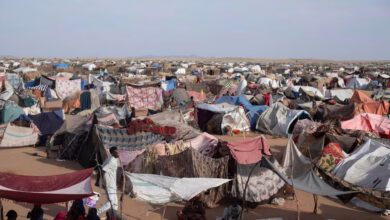
Eight people were killed Tuesday during a protest sparked by high prices in Sudan, police said, in the worst violence since Arab Spring-style demonstrations began more than six weeks ago.
"Eight citizens were killed and 24 injured, including three police who are in a serious condition," the official SUNA news agency quoted police as saying.
They are the first officially confirmed deaths related to scattered anti-regime protests which started around the country in mid-June.
An activist youth movement, Sudan Change Now, accused security forces of firing live ammunition and said 12 people, many of them teenagers, were killed.
Police did not give the cause of death but said officers used a "low level of force" to control the situation after demonstrators burned a petrol station and police facilities in the city of Nyala.
A witness earlier told AFP that police had fired tear gas at the demonstrators scattered in groups around Nyala's main market. He said protesters threw stones at government buildings and burned tires in the street.
Like other demonstrators in Sudan, they repeated a call made by Arab Spring protesters around the region: "The people want the fall of the regime."
Four bleeding protesters and three security officers were taken away for medical treatment from the demonstration, the witness said.
Nobody was allowed inside the city's hospital where a crowd had gathered outside, he added.
Demonstrations in Sudan started on 16 June when University of Khartoum students voiced opposition to high food prices, starting the longest-running public challenge to the 23-year regime of President Omar al-Bashir.
Inflation reached 37 percent year-on-year in June and jumped almost 10 points in May.
After Bashir announced austerity measures, including tax hikes and an end to cheap fuel, scattered protests spread to include a cross-section of people, often in groups of 100 or 200, around the capital Khartoum and in other parts of Sudan.
Protests have dwindled during the Muslim holy month of Ramadan, which began on 20 July.
But a strike by public transport drivers upset over high fuel prices has added to the burden of Nyala residents.
The strike apparently triggered a protest on Monday by more than 200 students, which escalated on Tuesday, the African Union-United Nations peacekeeping mission in Darfur (UNAMID) told AFP.
"This has been happening on the main roads and in the main market area. There's been some damage to buildings," said UNAMID spokesman Christopher Cycmanick.
Bothina Mohmed Ahmed, spokeswoman for the South Darfur government, told AFP the demonstration started because students "rejected the price of transport announced by the government."
She added that "other groups," whom she did not identify, attacked government property during the protest.
"But now the situation is calm and under control," Ahmed said.
"We and the security authorities have a plan to secure the town in the coming days."
State governor Hamad Ismail said that the demonstrators' targeting of government facilities was "similar to what the rebel groups are always doing."
"We confirm that what happened had no link to the economic situation," SUNA quoted him as saying.
Some activists in Khartoum have said that although tear gas, rubber bullets and beatings have been commonly used against protesters, the government fears creating a martyr.
In 1964, the death of student Ahmed al-Qureshi sparked Khartoum's "October Revolution," which brought down the military government then in power after tens of thousands protested.
During an economic crisis in 1985, huge crowds in the capital marched in an uprising which led to the bloodless overthrow of president Gaafar al-Nimeiry.
Sudanese proudly point to this history which occurred long before the Arab Spring revolts in Egypt, Tunisia, Syria and elsewhere since late 2010.
But Darfur is a long way from Khartoum, and the country's far-western region is no stranger to killings.
Banditry, inter-ethnic fighting and clashes between rebel groups and government forces continue in Darfur although violence is much lower than at its peak in 2003 and 2004 after non-Arab ethnic groups rose up against the Khartoum regime.
The United Nations says more than 300,000 people died in Darfur, while the Khartoum government put the death toll at 10,000.




